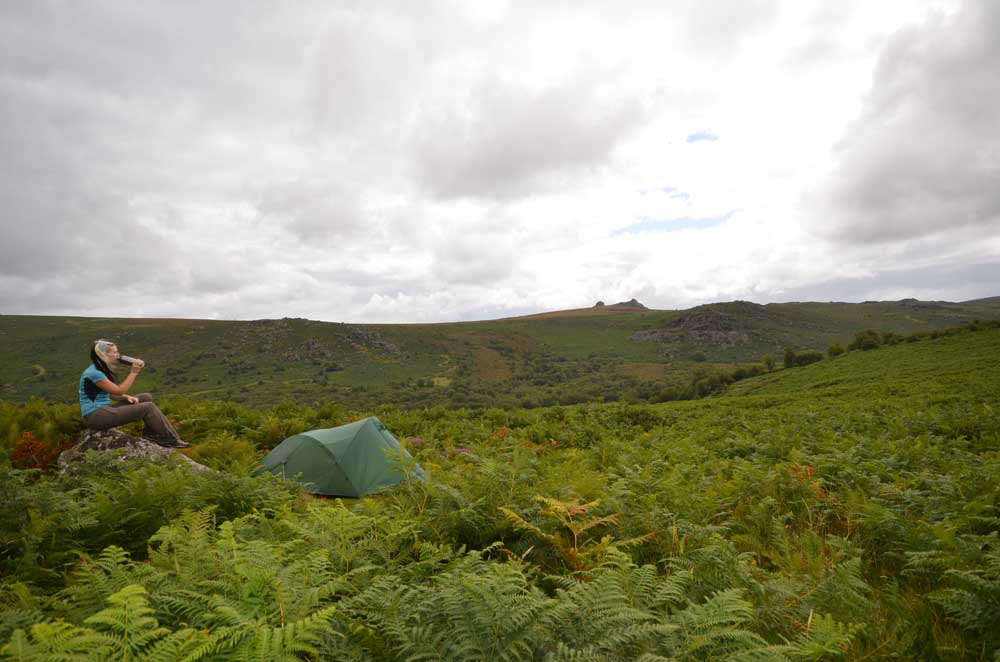Appeal planned over Dartmoor wild camping decision
Dartmoor National Park Authority seek right to appeal recent judgment that removed the legal right to wild camp across Dartmoor


The Dartmoor National Park Authority (DNPA) has announced its intention to go back to court and appeal a recent ruling that effectively removed the legal right for people to wild camp across the vast majority of the Dartmoor Commons.
In a case brought by millionaire landowners Alexander and Diana Darwall, a judge in the High Court ruled that wild camping does not constitute a recreational activity and therefore people had no right to pitch a small tent or bivvy on the moor under the terms of the Dartmoor Commons Act 1985, as they had been doing for the last three and a half decades.
The judgement provoked widespread dismay and anger among the outdoor community and well beyond, not least because Dartmoor was the last place in the whole of England and Wales where wild camping remained legal, in stark contrast to Scotland, where the activity is permitted almost everywhere. Last weekend over 3,000 people joined a peaceful protest on part of the moor bought by the hedge fund manager ten years ago.

After the judgment, an ‘agreement in principle’ was cobbled together between the national park authority and landowners that seemed to allow the continuation of wild camping on a much-reduced section of the commons – detailed on an interactive map on the DNPA website – which, initially at least, excluded all of the Darwalls’ land, and several other sections of the national park.
This did very little to assuage the fears and anger of groups ranging from youth group leaders to access campaigners such as the Right to Roam and The Stars are for Everyone, who expressed dismay that that DNPA were being forced to make a payment to the land owners in order for wild camping to continue, in a more restricted form. People such as author and activist Guy Shrubsole quickly pointed out that the legal right to wild camp had still been removed (instead it had become a permissive issue), and the land available to wild campers had been summarily reduced by more than 12,000 acres (49 sq km), on the basis of a highly questionable judgement. Because, if wild camping isn't recreational – what is it?

Author and access campaigner Guy Shrubsole speaking at the Dartmoor protest walk
Since then, the Darwalls, who conduct lucrative and destructive pheasant shoots and deerstalking on their land, have disingenuously sought to present their actions as an attempt to combat problematic behaviour on the moor, releasing a statement that says: "The truth is that there is no threat to access or true wild camping… Dartmoor is increasingly under pressure from fly campers, litter, raves and so on - a small number of people who spoil it for everyone.”
However, fly camping (where people camp in big groups and leave large amounts of rubbish behind) and outdoor raves are not remotely similar to the kind of wild camping that walkers, backpackers, youth groups, stargazers and wildlife enthusiasts enjoy. The activities described in the Darwalls’ statement were very clearly not permitted under the previous interpretation of the law, which permits responsible recreational activities to be conducted by those who have arrived by foot or horseback, and specifically excludes things such as lighting fires and littering.
Get all the latest news, reviews, deals and buying guides on gorgeous tech, home and active products from the T3 experts
As campaigners have made very clear, the change in interpretation of the law has simply outlawed the practice of respectful, leave-no-trace wild camping, which has been part of the outdoor culture of Dartmoor for decades.

The Darwalls purchased 4,000 acres (16 sq km) of southern Dartmoor in 2013 in the full knowledge that it was a place used by wild campers, whose activities have caused not a single complaint or problem for the 35 years the law has been in place. Had wild campers had been causing damage to the moor, or disruption or annoyance to other users, then it seems highly unlikely the Dartmoor National Park Authority would have defended and supported the continuation of the pursuit.
To the relief of access campaigners, despite the recent set back and the costs that it has incurred the park authority, lawyers acting for the DNPA are set to argue that the judgment is flawed because it doesn’t accept wild camping as a recreational activity, and it fails to take into account the historic understanding of the law.
On Friday, Kevin Bishop, the chief executive of the Dartmoor National Park Authority, said: “The high court judgment raises important issues of public interest that are central to the purpose of our national parks. For this reason, the authority has determined to seek permission to appeal against the judgment.
“Our national parks are largely owned by private individuals, and we respect their rights. However, our national parks were designated by parliament for their national importance. They have twin purposes: to protect and conserve, and to provide opportunities for all parts of society to responsibly enjoy them.”

Author of Caving, Canyoning, Coasteering…, a recently released book about all kinds of outdoor adventures around Britain, Pat Kinsella has been writing about outdoor pursuits and adventure sports for two decades. In pursuit of stories he’s canoed Canada’s Yukon River, climbed Mont Blanc and Kilimanjaro, skied and mountain biked across the Norwegian Alps, run ultras across the roof of Mauritius and through the hills of the Himalayas, and set short-lived speed records for trail-running Australia’s highest peaks and New Zealand’s nine Great Walks. A former editor of several Australian magazines he’s a longtime contributor to publications including Sidetracked, Outdoor, National Geographic Traveller, Trail Running, The Great Outdoors, Outdoor Fitness and Adventure Travel, and a regular writer for Lonely Planet (for whom he compiled, edited and co-wrote the Atlas of Adventure, a guide to outdoor pursuits around the globe). He’s authored guides to exploring the coastline and countryside of Devon and Dorset, and recently wrote a book about pub walks. Follow Pat's adventures on Strava and instagram.